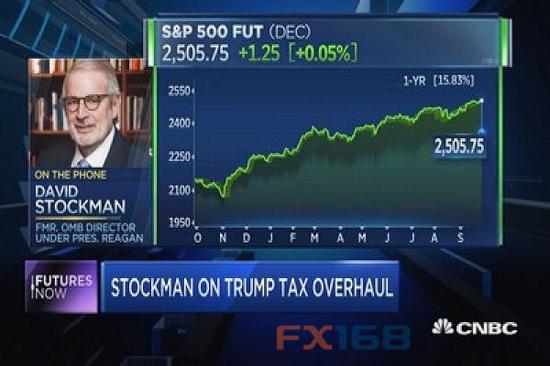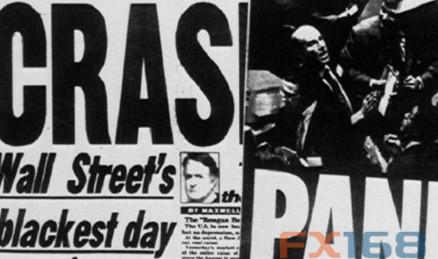![]() US stock market center: exclusive supply of the US stock industry sector, pre-market, ETF, right confirmation market
US stock market center: exclusive supply of the US stock industry sector, pre-market, ETF, right confirmation market
The alarm sounded! The market is so arrogant that the 1987 crash will be staged again?
FX168 Financial News (Hong Kong) News also remember the 1987 crash? At that time, the US stock market index collapsed by nearly 23% in just one day. Some market experts wrote on Tuesday (October 3) that there are many similarities between the current market and 1987, and investors should plan ahead. Coincidentally, David Stockman, the father of Reagan's economics, has also issued a heavy warning. The Trump administration's tax reform plan and the Federal Reserve's (FED) policy may cause the stock market to suffer a serious sell-off. The decline may be astonishing 40- 70%.
Dips 23% in one day! The 1987 crash will be staged again?
Nigar Arora, founder of The Arora Report, wrote on Tuesday (October 3) that in the month of 30 years ago, I invested millions of dollars in the stock market. Other investors have done the same, everyone is making money.
However, on the ground, on October 19, 1987, the Dow Jones Industrial Average collapsed by 22.6% in just one day, while the S&P 500 index plunged 20.5%. This day is called "Black Monday" or "87 stock market crash."
After 30 years, will the stock market fall at the same rate? If so, what should you do to protect yourself? These are the key issues investors should consider now, as the overall trading of the US stock market is at an all-time high. History is not always repeated, but we must learn and explore from history.
Similarities
The six major similarities between the current and 1987 stock markets are shown in the chart below:
 (Chart source: The Arora Report, FX168 Financial Network)
(Chart source: The Arora Report, FX168 Financial Network)
For the first similarity, some explanation is needed. In 1987, fund managers were complacent to buy stocks because they believed the stock market was a one-way street – profitable and risky. They buy portfolio insurance sold by Wall Street's "sorcerers" and in theory they should be protected from losses. Portfolio insurance is done through derivatives such as options and futures. In hindsight, we now know that portfolio insurance has not only failed to protect them, but has also accelerated the sell-off.
At the moment, there is a similar danger in the popularity of exchange-traded funds (ETFs), especially the large capital flows of passive investors in ETFs. At this time, most investors don't have any knowledge of the risks of passive ETF investment. Just like in 1987, most portfolio managers don't understand the risks of portfolio insurance.
When it comes to stock market sentiment, investors need to be cautious. Relevant figures, such as data from the American Association of Individual Investors (AAII), are based on surveys. In the Arora report, our research shows that in this bull market, investors' speech and behavior are very different. For this reason, the “proprietary sentiment†metrics we use in the Arora report give greater weight to what investors are actually doing, and give them less weight.
According to Arora's proprietary indicators, the current stock market is very optimistic, but not extremely optimistic. This is not a fuss. Extremely optimistic emotions tend to be an opposite indicator, often before the market falls.
As in 1987, valuations are high and corporate earnings are rising. Interest rates have also risen in recent days. The rise in interest rates has pushed up popular banking stocks such as Bank of America, Citigroup and JPMorgan Chase, as well as Schwab and E * TRADE Financial corp. , the popular brokerage stocks such as Ameritrade. In his latest speech, Federal Reserve Chairman Yellen hinted that the Fed is determined to raise official interest rates in December. The market believes that the probability of a rate hike in December is only 60%, and basically does not believe in Yellen. In 1987, the absolute interest rate was much higher, but as it is now, interest rates are rising.
Selling signal
With these similarities in mind, should you sell your stock? If not, how will you protect yourself? In order to analyze the situation, we must not only look at similarities, but also the difference between today and 1987.
As in 1987, the current general view is that the stock market is optimistic rather than selling stocks.
Arora has long pursued a belief in opposing mainstream views and giving a clear sell-off signal. For example, in the fall of 2007, the Arora report gave a signal to sell stocks, demanding that 100% of the stock be converted into cash. Later, the Arora report gave signals of large short ETFs, such as emerging market ETFs, stock ETFs, financial stocks ETFs, Chinese stock market ETFs, Standard & Poor's 500 Index ETFs, Indian stock market ETFs, and so on. For those investors who can't sell, Arora reports calling for a reverse ETF. Then in 2008, most investors lost half of their stock portfolio value, and Arora reported that the recommended portfolio generated huge profits.
When the price of gold hit a high point and everyone was bullish on gold, the Arora report gave a clear signal of a sell-off at $1,904 per ounce, which eventually proved to be the top. Now, I use the ZYX global multi-asset configuration model with automatic adaptation, which has 10 investment time and risk control. The current timing model does not give a sell signal, but it is worthy of caution.
What should I do now?
As the first business, investors now need more reliable and proven models than ever before, such as using ZYX's global multi-asset model to control risk and know when to sell. Investors should not rely solely on opinions because their opinions are a dozen.
The important thing is that investors have to look ahead, not from the rearview mirror.
Consider continuing to hold existing positions. Based on personal risk appetite, consider holding 19%-29% of cash or short-term Treasury bills, 15%-25% of medium-term hedge funds, and 15% of short-term hedges. This is a great way to protect yourself and also allows you to participate in the upswing.
It's worth remembering that if you don't hold cash, you can't take advantage of it. When adjusting the hedging level, consider adjusting the partial stop loss (non-ETF) of the stock position; consider using a wider stop loss on the remaining quantity, while also allowing more space for high beta stocks. High beta stocks are more volatile than the entire market. Please note that today's hot tech stocks such as Apple, Amazon, Amazon, Tesla and Tesla are all high beta stocks.
"Father of Reagan's Economics" sent Wall Street "terror" warning: the market plunged by as much as 70%!
According to CNBC, a well-known overseas financial website, on Friday (September 29), David Stockman warned that the Trump administration's tax reform plan and the Federal Reserve's (FED) policy may cause the stock market to suffer a serious sell-off. David Stockman is the director of the White House Budget Office during the Ronald Reagan period.
Stockman still maintains the previous view that the US stock market's eight-and-a-half-year rebound is facing a serious threat.
Stockman recently said in an interview with CNBC: "Every 7 to 8 years, the market will undergo an adjustment, ranging from 40% to 70%."
 (David Stockman Image Source: CNBC, FX168 Financial Network)
(David Stockman Image Source: CNBC, FX168 Financial Network)
Stockman also likes the stock market at the moment as a "casino." He warned investors, "If you have to work for a living, leave the casino because it is a dangerous place."
Stockman has made similar predictions many times before, but it has not become a reality.
Stockman told CNBC in June that the S&P 500 could easily fall to 1600 points, which represented a 34% decline. Last week, the S&P 500 index hit a record high again, breaking through 2,500 points.
Stockman blames a large part of the responsibility on the Fed and its ultra-loose monetary policy. He believes that the stock market is now in a "bubble" created by the Fed.
In the worst period of the 2007-2009 financial crisis, the S&P 500 index plummeted by as much as 58%. This happened in March 2009.
 (Source: Business Insider, FX168 Financial Network)
(Source: Business Insider, FX168 Financial Network)
David Stockman is one of the most important tax cuts in the United States and the director of the White House Budget Office during the Reagan era, known as the "Father of Reagan Economics."
Stockman believes that the tax reform plan launched by US President Donald Trump on Wednesday will not prevent the market from being sold out. He said earlier that Wall Street believes that the tax reform plan will be passed, which is a "dream".
Stockman said that White House economic adviser Gary Cohn and Treasury Secretary Steve Mnuchin "have not provided any details, any leadership, any plans." They should all be fired because they made the president very, very disappointed. "
In Stockman's view, not only Washington's "dysfunctional" but also the Fed may eventually make its long-term pessimistic predictions a reality. He said that there will be a "catalyst" factor that will cause the stock market to plummet, but it is still unclear.
When talking about President Trump, Stockman said: "In the past, you will see a black swan, and now you may see an orange swan, the one in the Oval Office. 'Orange Swan' doesn't seem to stop tweeting, so the whole process can't do anything."
The idea that Trump was called "Orange Swan" first appeared during the US presidential election last year. At that time, some market participants believed that Trump’s victory in the US election was an “Orange Swan Eventâ€.
Proofreading: Sui Bin

Editor in charge: Zhang Yujie SF107
With 3 factories, options for material fabrics are from yarn size 40s to 120s, thread count ranges from 200TC to 1000TC and patterns include plain, satIn, satin stripe, grid and jacquard for you to choose.
Our main products are:
1. Hotel bedding fabrics
2. Hotel duvet covers, bed/flat sheets, fitted sheets, pillowcases
3. Hotel duvets, pillows, mattress protectors, mattress toppers
4. Face towels, hand towels, bath towels, bath mats, slippers and hotel bathrobes
Hotel Bedding Set,Hotel Sheet Bedding Set,Hotel Bedding,Bedding Set
Shaanxi Xiaoze Textile Co., Ltd. , https://www.xtsxxzth.com